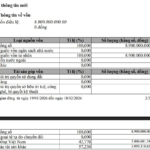
Professor and Doctor Dang Viet Anh, University of Manchester (UK). (Photo: Huu Tien/VNA)
|
Resolution 68-NQ/TW of the Politburo on private sector development is a pivotal document with significant shifts in perception and thinking towards the private economic system. It emphasizes the pivotal role of the private sector in boosting Vietnam’s growth.
Professor and Doctor Dang Viet Anh from the University of Manchester (UK) shared this assessment during a recent interview with correspondents in the UK regarding Vietnam’s policy on private sector development.
According to Professor Viet Anh, Resolution 68 sets forth a vision and specific goals. By 2030, Vietnam aims to have at least 1 million additional private enterprises, and by 2045, another million, bringing the total to at least 3 million, contributing approximately 60% of GDP compared to the current 50%.
Professor Viet Anh highly appreciated the concrete solutions mentioned in the resolution to create a fair and transparent playing field for private enterprises. Notably, it aims to further improve the business environment by reducing time and costs for enterprises and streamlining administrative procedures for registering, merging, acquiring, and dissolving businesses.
Resolution 68, as Professor Viet Anh pointed out, addresses the significant issues faced by private enterprises: lack of capital, human resource quality, and investment in research and development (R&D).
The resolution proposes solutions to support private enterprises, particularly small and medium-sized enterprises, in accessing capital, especially loans from banks and investors. It also emphasizes enhancing human resource quality through training collaborations between enterprises and universities and adopting new technologies to improve labor quality.

The private sector is expected to break through and develop, propelling the country’s economy into a new era of strength. (Photo: The Duyet/VNA)
|
Additionally, Resolution 68 underlines the necessity of continued investment in R&D, particularly in innovation, which is crucial for long-term enterprise development.
Professor Viet Anh suggested that Vietnam should prioritize investment in areas of strength, such as electronics, electrical appliances, garments, and agriculture, as well as emerging fields like artificial intelligence (AI), blockchain, digital assets, electronic assets, and information technology.
He also pointed out an essential solution to enhance the position and export capacity of Vietnamese private enterprises: integrating into regional and global markets through cooperation with prominent global corporations like Samsung Vietnam.
Regarding the current capabilities of Vietnamese private enterprises, Professor Viet Anh assessed that Vietnam has an efficient system with 1 million enterprises and 5 million individual households. This sector plays a crucial role in the economy, contributing nearly 50% of GDP, about 60% of investment, and around 30% of state budget revenue. It provides employment for approximately 40 million laborers, accounting for roughly 80% of jobs in the economy.
According to Professor Viet Anh, the private sector also significantly contributes to reducing inequality between regions, between urban and rural areas, and gender inequality in Vietnam. With about 5 million individual households and 1 million enterprises, the private sector drives local economic development and creates jobs, particularly for women.
Professor Viet Anh emphasized that with the concrete solutions outlined in the resolution, it is essential to put them into practice. He suggested enacting laws and regulations to establish a transparent business environment and enhance enterprise management policies, thereby elevating the quality and quantity of Vietnam’s economy and its private enterprise system.
Speaking about the role of the private sector in developing countries, Professor Viet Anh affirmed its significance in nations like Vietnam. Private enterprises, facing direct market competition, operate more efficiently by enhancing production capacity, increasing labor productivity, and reducing costs.
In developing economies, the private sector currently contributes 70-80% of GDP and generates 80-90% of total employment.
According to studies, the private sector also accounts for up to 90% of investment in innovation, research, and development—key factors for enterprises to enhance their competitiveness.
Professor Viet Anh cited examples of prominent private enterprises in developed and developing countries, such as Apple in the US, Samsung in South Korea, and BYD in China, which play crucial roles in their respective economies. Many of these companies invest significantly in R&D and innovation for production.
Additionally, alongside the public sector, the private sector can participate in investing in various fields like infrastructure, healthcare, education, and social welfare. This not only reduces the investment burden on the state but also contributes to the economy.
The private sector also plays a significant role in sustainable development, including green transformation and the development of new and green technologies.
Minh Hop-Huu Tien-Phong Ha
– 05:00 26/08/2025
The Power Trio: BSH, VIG & TAPTAP’s Strategic Alliance for Sustainable Growth
As insurance needs become increasingly intertwined with life experiences, consumers demand swift and transparent solutions. The collaboration between BSH Insurance, VI Group, and TAPTAP does not merely bring insurance closer to digital-savvy consumers but also forges a multifaceted ecosystem where both customers and businesses thrive.
The Master Wordsmith: Crafting Captivating Copy that Elevates Your Web Presence
Unveiling the Art of Asset Recovery: How Mr. Truong Gia Binh Retrieved a Whopping $700 Million
FPT’s stock has plummeted by over 31% since the start of the year. This sharp decline has investors concerned about the future prospects of this once-promising company. With such a significant drop, it’s clear that FPT is facing challenges that are impacting its performance and worrying shareholders. The question now is: what steps will FPT take to address this downward trend and reassure its investors?
Unlocking Housing Opportunities: Hai Phong Seeks Investors for Two Social Housing Projects Valued at 2.5 Billion VND
The Hai Phong Department of Construction has just invited interested investors to register as investors for two social housing projects in An Duong Ward, with a total investment of approximately VND 2,500 billion.
The Alphanam Group’s Ambitious Plans: Proposing 5 Mega Projects Totalling Over 1,000 Ha in Can Tho
The bustling city of Can Tho has big plans for the future, and it is knocking on Alphanam’s door to make them a reality. With a vision to kickstart development, the city proposes that Alphanam take the driver’s seat and coordinate efforts to break ground on one or two pivotal projects by 2025. This ambitious timeline underscores the urgency and potential for transformative growth in the region.




















